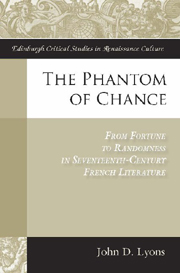Book contents
- Frontmatter
- Contents
- Preface: The Phantom of Chance
- Acknowledgements
- Series Editor's Preface
- Introduction
- 1 Fortune, Mistress of Events: Corneille and the Poetics of Tragedy
- 2 God in a World of Chance: Pascal's Pensées and Provincial Letters
- 3 From Chance Events to Implausible Actions: Lafayette and the Novel
- 4 The God of Suspense: Bossuet's Providential History and Racine's Athalie
- 5 An Accidental World: La Bruyère's Characters
- Conclusion
- Bibliography
- Index
Preface: The Phantom of Chance
Published online by Cambridge University Press: 12 September 2012
- Frontmatter
- Contents
- Preface: The Phantom of Chance
- Acknowledgements
- Series Editor's Preface
- Introduction
- 1 Fortune, Mistress of Events: Corneille and the Poetics of Tragedy
- 2 God in a World of Chance: Pascal's Pensées and Provincial Letters
- 3 From Chance Events to Implausible Actions: Lafayette and the Novel
- 4 The God of Suspense: Bossuet's Providential History and Racine's Athalie
- 5 An Accidental World: La Bruyère's Characters
- Conclusion
- Bibliography
- Index
Summary
It is difficult to write a book about something that does not exist. For a brilliant novelist like Flaubert, the dream of writing a book about nothing – un livre sur rien – is tempting, but for the more pedestrian scholarly writer who depends on an object to describe there is something hopeless about such a project. So a book about chance in seventeenthcentury France, the high point of rationalist thought, seems to be condemned even before it begins. Lorraine Daston writes eloquently:
In the clamorous debates of seventeenth-century philosophy […] there was one unisonal chord struck: the unanimous and resounding rejection of the reality of fortune. Antipathy to fortune united Protestant and Catholic, mechanical philosopher and Cambridge Platonist, Hobbesian with Christian virtuoso.
And yet …
The very rationalists who rejected chance – la fortune or le hasard – as being simply a name for human ignorance continued to write as if there were many things that happened by chance. Arnauld and Nicole open their important Logic, or the Art of Thinking (La Logique, ou l'Art de penser, 1683) by saying, ‘This little work was born entirely by chance …’ (‘La naissance de ce petit ouvrage est due entièrement au hasard …’).
- Type
- Chapter
- Information
- The Phantom of ChanceFrom Fortune to Randomness in Seventeenth-Century French Literature, pp. vi - xviPublisher: Edinburgh University PressPrint publication year: 2011



